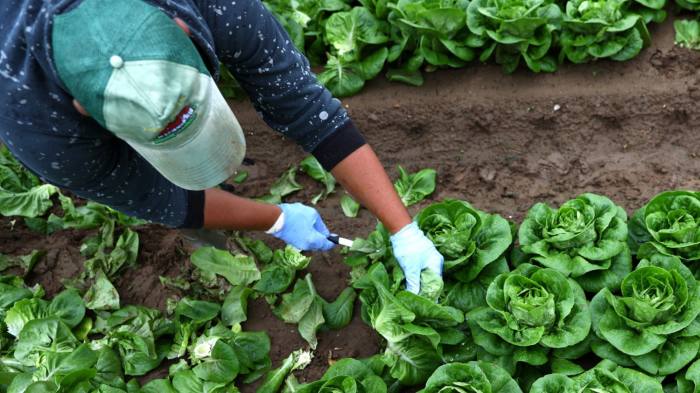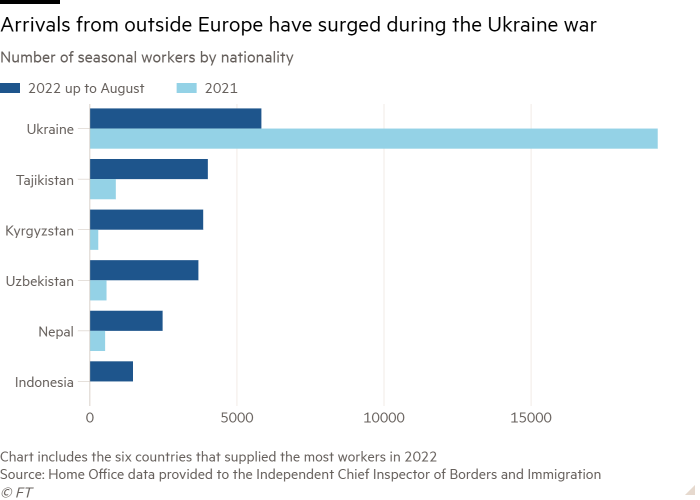UK retailers urged to compensate Nepalese and Indonesian ex-farm workers
Original Source: Financial Times – Oliver Telling in London and Jyotsna Singh in Delhi – 30th March 2023
UK retailers and supermarkets have been urged to compensate Nepalese and Indonesian labourers formerly employed on UK farms, after they claimed they were struggling to pay off debts because they can no longer work in Britain.
Labourers told the Financial Times of their troubles after the UK government revoked the licence of a key agriculture recruitment company and other British groups ruled out hiring from Nepal and Indonesia.
The moves by ministers and recruiters followed warnings that brokers in Asia had exploited seasonal workers from both countries, charging them exorbitant fees and leaving them working in effect to clear debts.
Debt bondage is recognised by the International Labour Organization as an indicator of forced labour, and charging recruitment fees is against UN principles backed by the UK.
But the sudden end to hiring from Nepal and Indonesia has crushed workers’ hopes that they could return to the UK and recoup some of their losses, and added to fears about labour shortages in the agricultural sector.

Investors and activists who had already called for supermarkets to compensate workers in their supply chain have repeated their demands for action.
Comments by Andy Hall – UK Retailers Should Compensate the Workers
Andy Hall, an independent labour rights campaigner in Asia, said it was “terrible” that retailers had not already compensated workers.
“Not only are [UK businesses] not remediating them, they are not helping them to come back,” he said, noting that low farm profits meant “only the supermarkets” could provide full compensation.
Martin Buttle, better work lead at CCLA, the UK’s largest fund manager, said the group was calling on supermarkets to recompense workers and for ministers to “address failures” in the seasonal worker scheme.
Dame Sara Thornton, former anti-slavery commissioner and now a consultant to CCLA, added: “[Recruiters have decided] to stop the risk to themselves [by avoiding Nepal and Indonesia]. We want the harm to be put right.”
About 15 per cent of the UK’s seasonal labourers came from Nepal and Indonesia between January and August 2022, according to Home Office data, after post-Brexit visa bureaucracy and the Ukraine war forced employers to look beyond Europe.

Ramesh Bahadur Thapa, a father of two, said a man from his village in Nepal had helped him secure a UK seasonal worker visa for £3,750, which he paid by selling his truck.
Thapa said he had hoped to obtain six months’ work but was asked to return home after just two months and earning £1,781 after expenses, leaving him unable to pay back the money he originally borrowed to buy his truck.
“My family keeps asking me when I am going [back to the UK],” he said. “I don’t know what to say. I have to do something as I am in debt. I just don’t know where to start.”
An Indonesian father of three, who asked not to be named, said he had taken out a £2,700 bank loan that helped cover the costs of moving to the UK last year, which included £3,510 paid to a local agency.
He had also expected to work for six months but said he returned home with £4,590 after working for three. He said he had been left to repay his bank loan in monthly instalments of roughly £120, but that his chicken farm in Indonesia had failed, meaning he may be forced to sell land.
Four workers said they had been brought to the UK by Kent-based AG Recruitment, one of a handful of British companies appointed by the government to recruit seasonal workers from abroad.
All hoped to return to the UK before AG’s licence was suddenly dropped by the government this year. The five remaining recruiters for the UK agriculture sector have said they are no longer hiring from Nepal or Indonesia, with one explicitly citing concerns about worker exploitation.
The Need to Reduce the Risk of Worker Exploitation
Sophie De Salis, sustainability policy adviser at the British Retail Consortium, which represents supermarkets, said its members had been working with the government, recruiters and farms to reduce the risk of worker exploitation. She pointed to the recent formation of a task force that plans to fund audits of UK recruiters and their overseas counterparts.
The UK government said workers’ welfare was “of paramount importance”, that it was “clamping down on poor working conditions and exploitation”, and would “always take decisive action where we believe abusive practices are taking place”.
It added that it worked “closely” with licensed recruiters, who had “responsibility for ensuring the welfare of migrant workers . . . and managing the recruitment process overseas”.
AG did not respond to a request for comment. AG has reportedly denied knowing that workers had been charged by brokers in Asia.
Related Background News and Articles
- UK Seasonal Worker scheme endangers vulnerable foreign workers (My Opinion – BHRRC Blog Series 17th March 2023).
- ‘They treat you like an animal’ – How British farms run on exploitation/Unions and NGOs Demand Reform to UK’s ‘Abusive’ Farm Worker Visa Programme (VICE World News/TBIJ, 27th March 2023).
- The Murky Business Behind Britain’s Rampant Food Price Inflation (Bloomberg, 24th March 2023).
- UK supermarkets to fund audits on farms to prevent worker exploitation (Financial Times, 11th Mar 2023).
- Unions and NGOs Demand Reform to UK’s ‘Abusive’ Farm Worker Visa Programme (VICE World News 28th Mar 2023).
- Working in the UK: Thousands of Indonesian citizens have lost hope of leaving in 2023 (BBC Indonesia, 7th Mar 2023).
- Farm workers on UK seasonal visas to be guaranteed 32 hours a week (Guardian, 24th Feb 2023).
- AG Recruitment, UK recruiter of debt-hit Indonesian and Nepali migrant workers, loses seasonal workers scheme license following forced labour related allegations, worker abscondments and asylum claims (Guardian, 10th Feb 2023).
- UK farmers stop recruiting Nepalese workers after exploitation warning (Financial Times, 28th January 2023).
- Home Office accepts recommendations in Chief Inspector’s report on immigration system as it relates to the agricultural sector (Freeths, 16th Jan 2023).
- Immigration: Investors warn food companies about risk of forced labour on UK farms (Financial Times 19th Dec 2022).
- Investor statement on the UK Seasonal Worker Scheme (Public Investor Statement 19th Dec 2022).
- Seasonal fruit pickers from Nepal left thousands in debt after being sent home early from UK farms – (Guardian 13th Nov 2022).
See more: March 15th 2023: ‘If we leave, Nepal will suffer’: embattled hospitals fear impact of UK job offers.


